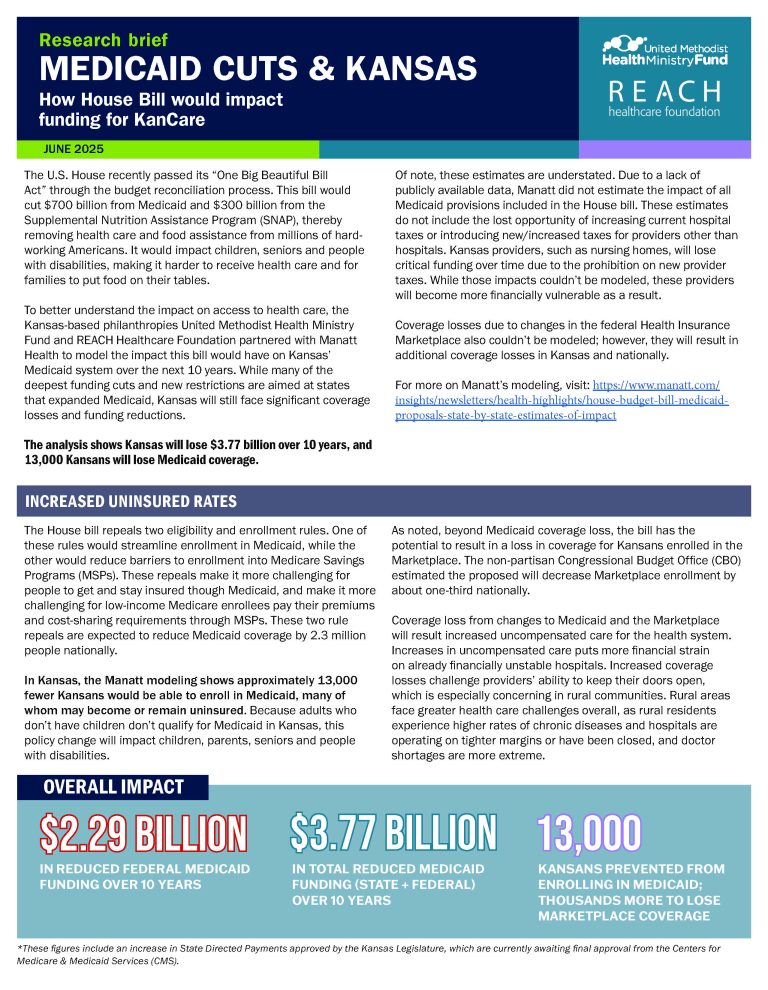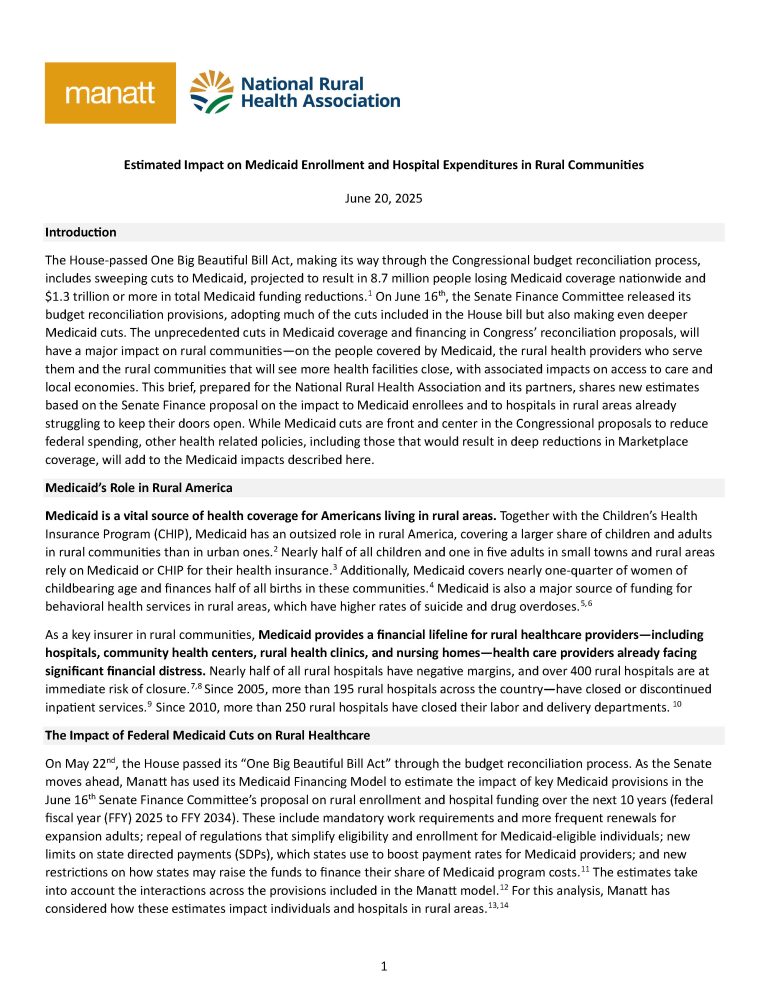New report: Kansas to lose even more funding under Senate’s changes to ‘One Big Beautiful Bill,’ thousands to still lose access to health insurance
New modeling shows Kansas will lose $4.05 billion in total Medicaid funding under the U.S. Senate Finance Committee’s proposed changes to the House’s “One Big Beautiful Bill Act,” increasing the funding reductions from the House proposal by $279 million. Under the Senate proposal, like the House bill, 13,000 Kansans are still projected to lose access to enrolling in Medicaid. Such losses would lead to higher uninsured rates and create more financial struggles for rural hospitals already on the brink of closure.
Beyond the $4 billion in Medicaid cuts, the Senate proposal also freezes provider assessments, which while not modeled, would negatively impact Kansas by prohibiting providers like nursing homes from raising revenues to meet health care needs of their communities.
These results were recently released by Manatt Health, which conducted the analysis at the request of Kansas health philanthropies United Methodist Health Ministry Fund and REACH Healthcare Foundation. The two organizations wanted to better understand the financial and enrollment impacts of the latest bill, which would cut $700 billion from Medicaid and $300 billion from the Supplemental Nutrition Assistance Program (SNAP).
Medicaid, the public health insurance program that covers more than 366,000 Kansans, is funded jointly by the state and federal government. It provides health insurance for low-income parents, children, seniors and people with disabilities. Adults who do not have children do not qualify for Medicaid in Kansas.
The Senate proposal also will have a direct and disproportionate impact on rural communities. A new report released by the National Rural Health Association today found that under this proposal, rural hospitals on average are slated to lose 21 cents out of every dollar they receive in Medicaid funding. Total cuts in Medicaid reimbursement for rural hospitals nationwide — including both federal and state funds — over the 10-year period covered by the bill would reach almost $70 billion. The Senate bill’s cuts to rural hospitals are more than 15% greater than the already damaging $60 billion in cuts under the House bill. In Kansas, where more than half of rural hospitals are already at risk of closure, there would be a 15% reduction in Medicaid reimbursement for rural hospitals.
“Our hope was for the Senate to protect rural hospitals and minimize coverage loss. However, the plan the Senate is rushing through the process will cut $4 billion from our Medicaid program and make it harder to sustain health care in rural Kansas communities,” said David Jordan, president and CEO of the United Methodist Health Ministry Fund. “Rather than rush Medicaid cuts that harm Kansans, I urge the Senate to improve Medicaid and strengthen the rural health system.”
The modeling showed $2.46 billion in lost federal Medicaid funding alone and $4.05 billion when combined with associated state funding losses over a 10-year period. When looking at the direct impact to hospitals, they stand to lose $664 million in total Medicaid funding over the first year and $2.8 billion over 10 years.
Manatt said these estimates are understated. Due to a lack of publicly available data, Manatt was unable to estimate the lost opportunity of increasing current hospital taxes or introducing new/increased taxes for providers other than hospitals. While those impacts couldn’t be modeled, providers will become more financially vulnerable as a result. In addition, the model did not speculate how Kansas would respond if it were faced with steep losses in funding. Without an investment of new state dollars, the state may have to constrain base payments to providers, eliminate or narrow eligibility and benefits.
Coverage losses due to the bill’s changes to the Affordable Care Act’s Health Insurance Marketplace also couldn’t be modeled; however, they will result in additional Kansans losing health insurance.
“These cuts put entire communities at risk,” said Brenda Sharpe, president and CEO at REACH Healthcare Foundation. “When Medicaid funding is cut, people lose coverage and delay care. Rural hospitals will be especially challenged to stay open given higher levels of uncompensated care. For many rural Kansans, these hospitals are the only source for preventative care, prenatal visits and mental health support. Without them, families may be forced to go without care altogether.”
Kansas already has more hospitals at risk of closure than any other state in the country. Sixty-three rural hospitals are currently at risk, and 87% of Kansas rural hospitals are operating in the red. These hospitals struggle to survive with existing federal funding. Provisions in the bill would cause them to lose billions, making it even harder to stay open. When rural hospitals close, it removes job opportunities in addition to access to health care, creating a ripple effect in small communities.





